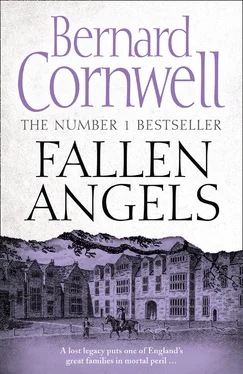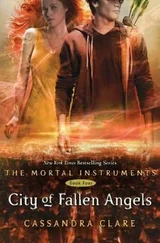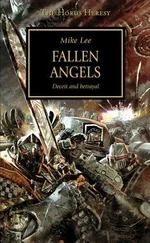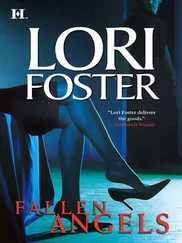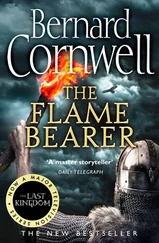They rode through the town and earned inquisitive looks from the people who watched them pass and then, as they came to the gatehouses, Lord Culloden reined in. He shook his head in amazement. Before him, like a hill of stone and glass, was the grandeur of Lazen. Seen thus for the first time it was easy to imagine why some people called Lazen ‘The Little Kingdom’.
‘It’s magnificent! Magnificent! I’d heard so, of course but…’ His voice tailed away.
She smiled. He could have said nothing better calculated to please her, such was her love of this place. ‘My father will want to thank you, my Lord.’
He blushed modestly. ‘I could not impose, my Lady.’
She dismissed his modesty, urged him onwards, and together they rode into Lazen.
It was the first time in three years that the fifth Earl of Lazen had left the Castle.
First he was carried downstairs by three footmen, then carefully placed on the cushioned seat of Lazen’s most comfortable travelling coach. He hated leaving his rooms. He hated outsiders to see his weakness.
He was sober this day. His face was pale and drawn, the face, Campion thought, of an old man. She was not going with him, but as she watched the blankets being tucked about his thin body she thought how the raw, winter light made him look a score of years older than fifty. His manservant, Caleb Wright, climbed into the coach and the door was shut.
The Earl nodded to Wright, who rapped on the coach roof, and then the Earl grimaced as the coach jolted forward. Even small movements gave him pain, yet he had insisted on going out this day.
There was not, after all, far to go.
The coach went down the driveway, through the huge gates with their stone carved escutcheons that showed the bloodied lance of Lazen on either post, past the gatehouses that curved forward in elegant wings, and then slewed right on the cobbles of the market place to take the Shaftesbury road.
Lord Culloden rode beside the coach. His face looked grim and wintry, suitable for this occasion.
Simon Burroughs, Lazen’s chief coachman, had brought extra horses and, when they reached the field at the bottom of Two Gallows Hill, they were harnessed to the six already pulling the coach so that the great vehicle could be hauled to the summit of the hill.
Waiting at the hilltop, as the coach heaved and jolted upwards, was a common cart. It stood close to the pitch-painted gallows that leaned eastwards towards the town.
A small group of men stood about the cart. They were cold. The Castle lay like a great stone monument in the valley beneath them. The smoke from its scores of chimneys drifted flatly over the winter-hard land.
The coach, creaking and swaying, reached the gentler slope at the hill’s top. The men standing about the cart pulled off their hats as the door was swung open. They could see the white face of the sick Earl staring from his seat. He raised a hand in acknowledgement of their muttered greetings.
The door had been opened so he could see what was about to happen.
Lord Culloden dismounted. ‘You’re ready, my Lord?’
‘I am.’ There was a grim pleasure in the Earl’s voice.
The turf about the gallows was worn thin. To the south Lord Culloden could see the heathland where he had rescued Campion. The sky above was grey and white. He nodded to the waiting, cold men about the cart. ‘Do your duty!’
The body of the man who had attacked the Lady Campion Lazender had been fetched from the heath. It had been stripped naked, then bound in a net of chains. The links jingled cheerfully as the men hauled the body off the cart, as it thumped on the ground, as they dragged it by the feet to the gallows.
The Earl watched.
The ladder had been forgotten, but one of the small boys who had come to watch shinned the upright and sat astride the crossbeam. A rope was thrown to him that he threaded through the rusted iron ring that was bolted to the beam. The lad stayed there.
They tied the rope to the chains at the nape of the dead man’s neck, then hauled him up so that he hung like a misshapen sack. He would rot now, the chains holding his decomposing flesh as the birds tore at him. By winter’s end he would be nothing but bones in rusted chain.
The Earl watched with grim satisfaction. It was a pity he could not have hanged the bastard alive, but he would hang him dead and in a place where, each dawn, the body could be seen from the Lazen valley; a warning to others who dared attack his family.
The small boy, while the men supported the weight of the dead man, tied the rope at the ring iron. The men let the body hang. It turned slowly, the head slumped down on the chains about the half cut neck. Lord Culloden stood back, touched his blond moustache, and looked at the Earl through the open carriage door. ‘May God damn his soul, my Lord.’
‘God can have his soul,’ the Earl said, ‘but I’ll have his bones. I’ll grind them for the pigs.’ He grimaced in pain. ‘Give the men their cash, my Lord, and add a half guinea for that lad! Then home!’
Campion, watching from the Long Gallery, saw the dark speck hanging on the skyline. Beside her, Mrs Hutchinson, her companion and chaperone, frowned. ‘Hanging’s too good for him, dear.’
Campion smiled at the old woman. ‘Where he’s gone, Mary, he’s suffering far worse.’
‘I hope so, dear, I hope so. You know me, I’m not vengeful, but I’d have torn his heart out with my own hands! I would, too!’
Campion laughed. ‘You can’t kill a moth!’
Mrs Hutchinson tried to look fierce and failed hopelessly. ‘Well at least Lord Culloden is staying on! I thank the good Lord for him, dear, truly I do.’
Campion looked at the old lady and smiled. ‘So do I.’
‘And you’ll pardon me for saying it, dear, but it is nice to have a gentleman about the house again! It’s been too long! Entirely too long.’
‘It has, Mary, it has.’ Campion smiled, and there came, inevitably and annoyingly, a sudden image of a black-haired man laughing with the small maid at the kitchen door, and she angrily thrust the image away. ‘I’m glad he’s staying.’ She made herself say it warmly, and she told herself, as she had told herself a dozen times since the awful attack on the heath road, that her meeting with Lewis Culloden was a miraculous providence of heaven. Lewis Culloden’s dramatic entry into her life had made her look up a half forgotten passage in Mr Burke’s book ‘Reflections on the French Revolution’, a passage which said that ‘the age of chivalry is gone. That of sophisters, economists and calculators has succeeded.’ Mr Burke, she thought, was wrong. The age of chivalry had come with a bright sword and the hammer of hooves on the lonely road to the south. A maiden had been rescued, a villain hanged, and a lord had come to a castle. Chivalry, she tried to persuade herself, yet lived.
‘If they kill their King,’ Valentine Larke said, ‘we should turn Paris into a slaughterhouse. To do nothing is to condone the crime. We will have to fight!’
His companion laughed. ‘With what? We’ve reduced the army again!’ The Prime Minister believed that Britain would not need an army now that the French nation, as Burke had prophesied, promised to destroy themselves in blood and fire.
Larke said nothing. He was staring into the Westminster night, waiting for a cab or chair to come to the steps of Parliament. Sedan chairs, now that London was growing at such a rate to make their journeys impossibly laborious, were increasingly rare. Larke’s broad face looked grim in the light of the great lanterns. Sleet was falling on the cobbles.
His companion shivered within his greatcoat. ‘You’ll get your war, Larke, but the Prime Minister wishes you wouldn’t call for it quite so fiercely.’
Читать дальше
